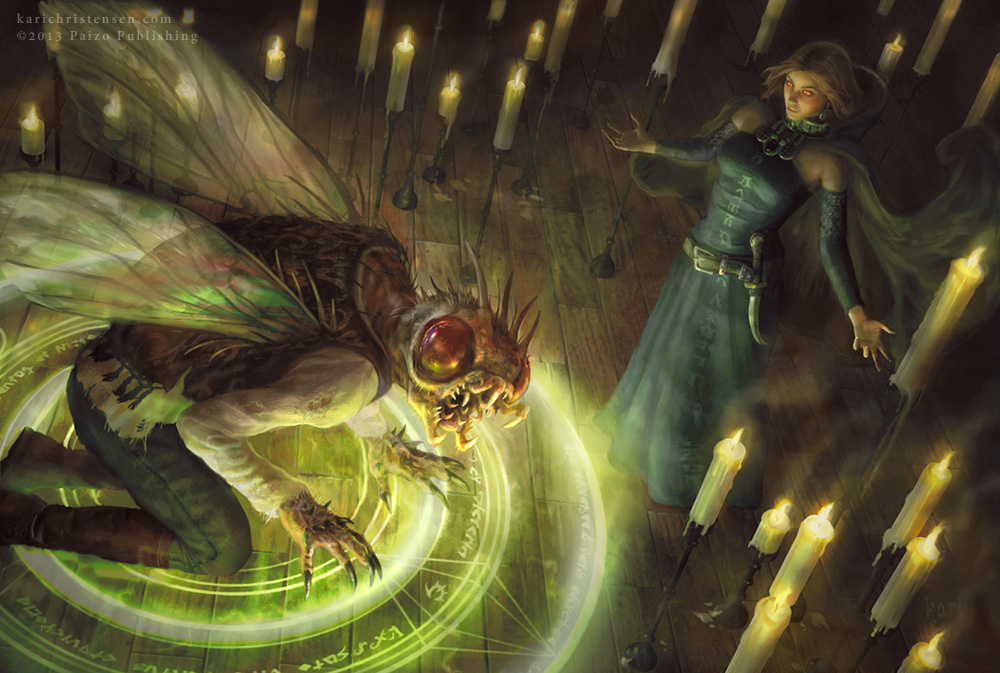Cacodaemon (spell)
Cacodaemon is a very complex spell that requires considerable time to perform, with the warning that some peril may befall a caster who has not become familiar with the proclivities of demons. Casting requires a space of 15 ft. square, in order that a pentagram and circle may be inscribed by the spell once the enchantment begins.
| Range | 10 ft. |
| Duration | see below |
| Area of Effect | 1 creature |
| Casting Time | 5-8 hours |
| Saving Throw | none |
| Level | mage (7th) |
Within the first two hours or so, the spell will create varying effects and materials which will become part of the ritual. A permanent pentagram, surrounded by a circle, will be etched into the floor, whether stone or wood, to a depth of about an inch — evidence that will remain after the spell has been completed. An illuminated piece of vellum will then materialize and levitate about two feet before the caster’s eye level, and for another hour, the somatic efforts of the caster will beautifully illuminate the sheet with words, symbols and bordering. This will roll itself and come to rest within the caster’s reach.
For three to six hours after, the spellcaster will labour intensely to cast his or her gaze into the depths of the Abyss, searching first for the demon that is wanted, then actively waiting to hear the demon’s name spoken in the void so that the demon can be called into the pentagram. During this process, the caster will sweat and breathe heavily, so that by the end, there will be a necessity to drink at least a quart of water and sleep for six hours. The total amount of time for casting — 5-8 hours — is random.
Once the demon is called, the caster will be faced with a creature that has been rudely drawn from its place of residence into the Prime Material Plane. Naturally, some concern is warranted. However, if the spellcaster is well-versed in the way of demons, there should be little problem. A nalfeshnee will be willing to perform a service for no more than a week, so long as it is given its freedom after. A marilith will seek combat among thousands of enemies, and will be content if this is what’s offered. A balrog will like an isolated lair where it can be installed and left alone. Glabrezu are both obsequious and unpleasant: so long as a table is made where it is able to gorge itself, it will consent to providing any service for a day. Hezrou like a sacrifice: a young man or a woman should be prepared in two cages, for it to choose which it prefers, and in exchange it will give information (but nothing else). Vrock are voracious scavengers, and are best called only when a scene, such as after a battle or a murder, needs cleaning up without evidence. Succubi and Incubi are far too independent to be affected by the spell; they will come if summoned, but will not comply with any entreaties or demands.
Woe betide the spellcaster, however, who calls a demon without providing what the demon wants. This will enrage the demon, who will then seek to break the confines of the pentagram. The strength of the pentagram is at best temporary; the caster must snap up the illuminated vellum manuscript that was created and begin reading it aloud, to maintain the integrity of the pentagram.
This requires intelligence as the manuscript’s words are read over and over. Already the caster will be exhausted from casting, so that the caster’s intelligence will have diminished by 1 point per hour needed to complete the spell. Each round that the manuscript is read, while the demon attempts to break its confines, the caster must make an intelligence check. A failure will mean that words on the manuscript were spoken poorly or clumsily, allowing the demon to break the pentagram and act freely.
After each intelligence check succeeds, the caster is allowed a wisdom check. If this is successful, the demon can be cast safely back into the Abyss.
Another spellcaster can read the manuscript once it is created ~ but this second character must be a mage and must be of at least 11th level. They will suffer no penalty to their intelligence, however.
If the spell spiritwrack is cast in the presence of a demon, the demon will immediately recognize the impending spell and be enraged. It is not recommended for use while the demon is inside the pentagram. The demon cannot be affected by the spells death and trap the soul, as it hasn’t any life or soul to be stolen away.
